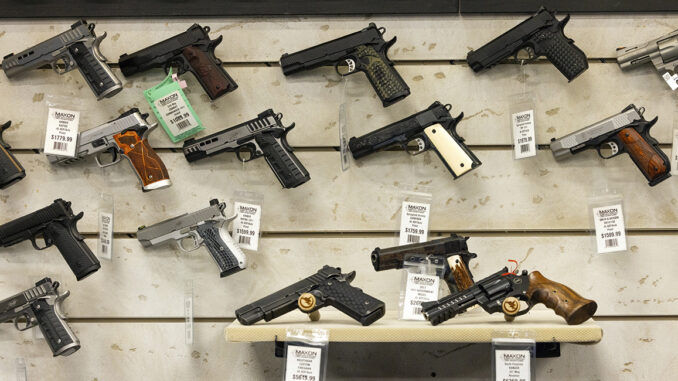
A new California law will require credit card networks like Visa and Mastercard to provide banks with special retail codes that can be assigned to gun stores to track their sales.
However, new laws in Georgia, Iowa, Tennessee and Wyoming will do the exact opposite, banning the use of specific gun shop codes.
Some Democratic lawmakers hope the new retail tracking code will help financial institutions flag suspicious gun-related purchases for law enforcement agencies, potentially averting mass shootings and other crimes. Lawmakers in Colorado and New York have followed California’s lead.
“The merchant category code is the first step in the banking system saying, ‘Enough! We’re putting our foot down,’” said Hudson Munoz, executive director of the nonprofit advocacy group Guns Down America.
But many Republican lawmakers and gun-rights advocates fear the retail code could lead to unwarranted suspicion of gun buyers who have done nothing wrong. Over the past 16 months, 17 states with GOP-led legislatures have passed measures prohibiting a firearms store code or limiting its use.
“We view this as a first step by gun-control supporters to restrict the lawful commerce in firearms,” said Lawrence Keane, senior vice president of the National Shooting Sports Foundation. This industry group backs laws that block the use of tracking codes.
The new laws add to the expansive national divide on gun policy. This past week, U.S. Surgeon General Vivek Murthy declared gun violence a public health crisis, citing a rising number of firearm-related deaths.
By contrast, Democratic-led New Mexico this year tightened laws for people who don’t have concealed-carry permits, requiring a seven-day waiting period for gun purchases, which is more than double the three days for a federal background check.
States also have responded differently to recent mass shootings. In Maine, where an Army reservist killed 18 people and wounded 13 others, the Democratic-led Legislature passed a variety of new gun restrictions. Following school shootings in Iowa and Tennessee, the Republican-led legislatures there took steps that could allow more trained teachers to bring guns into classrooms.
The surge of legislation targeting firearm store category codes addresses a behind-the-scenes aspect of electronic financial transactions. Based in Geneva, the International Organization for Standardization sets thousands of voluntary standards for various fields, including business category codes, from bakeries to boat dealers to bookstores.
The codes can be used by financial institutions to help identify fraud, money laundering or unusual purchasing patterns that are reported as suspicious activities to the U.S. Treasury Department’s Financial Crimes Enforcement Network.
Stores that sell guns have previously been grouped with other retailers in merchant category codes. Some have been classified as sporting goods stores, others as miscellaneous and specialty retail shops.
At the urging of New York-based Amalgamated Bank, which worked with gun-control groups, the International Organization for Standardization adopted a new four-digit category code for gun and ammunition shops in 2022. Major credit card networks initially said they would implement it but backed off under pressure from conservative politicians and the gun industry.
Munoz, who helped lead the effort to establish the firearms store code, noted credit cards were used to buy weapons and ammunition for some of the nation’s deadliest mass shootings.
A gun merchant code intends to spot suspicious patterns, like a person with little history of gun purchases who suddenly spends large amounts at multiple gun stores in a short period. Once alerted by banks, authorities could investigate, potentially thwarting a mass shooting, Munoz said.
California’s new law requires credit card networks to make the firearms code available to banks and other financial institutions by Monday. Those entities then have several months to determine which of their business clients should be categorized as gun stores and assign them new codes by May 1.
Visa recently updated its merchant data manual to add the firearms code to comply with California’s law.
Democratic-led legislatures in Colorado and New York also passed firearms code mandates this year that will kick in with California’s next May.
“If there were someone suspiciously purchasing a large number of firearms, right now it would be complicated to tell,” said California state Assemblymember Phil Ting, a Democrat who sponsored the new law. “You couldn’t tell if they were soccer, golf or basketballs.”
